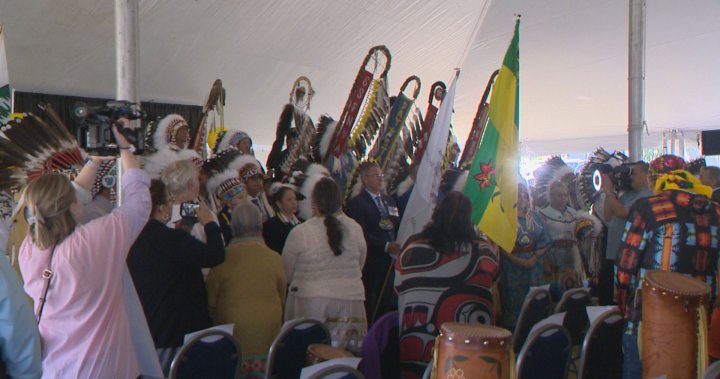Hundreds gathered in Fort Qu’Appelle, Sask., to commemorate the 150th anniversary of the signing of Treaty Four, a significant milestone in the relationship between Indigenous People of Canada and the Crown. The event was attended by Indigenous leaders, including Premier Scott Moe and Lieutenant Governor of Saskatchewan Russ Mirasty. First Nations Chiefs emphasized the importance of the treaty in solidifying the peaceful co-existence between the Indigenous Peoples and the Crown. Chief Lynn Acoose of Zagime Anishibek First Nation highlighted the sacred nature of the agreement, stating that all laws and beliefs were brought together when the treaty was signed.
During the event, Mirasty presented King Charles III coronation medals to several chiefs who shared their personal stories with the gathered attendees. The ceremony took place in a tent on Treaty Four territory, where the original treaty was signed in 1874. Former chief of the Assembly of First Nations, Parry Bellegarde, spoke about the darker chapters of history, such as the Indian Act enacted in 1876, just two years after the treaty. He emphasized the impact of this act, which restricted the freedom of Indigenous People and their access to basic rights until much later in Canada’s history.
Bellegarde stressed the importance of working towards the full implementation of the treaty according to its spirit and intent, rather than a legalistic interpretation. Current AFN Chief Cindy Woodhouse Nipenak echoed this sentiment, emphasizing the need to understand and acknowledge the shared history between Indigenous Peoples and the government. She highlighted the importance of coming together to discuss difficult issues and work towards a shared future, despite the discomfort it may bring. Nipenak emphasized the significance of open dialogue in addressing longstanding issues and moving forward as a unified community.
The event in Fort Qu’Appelle served as a reminder of the ongoing impact of historical treaties and agreements on Indigenous Peoples in Canada. By recognizing the significance of Treaty Four and discussing the challenges faced by Indigenous communities in the past, attendees demonstrated a commitment to understanding and addressing these issues. Through storytelling and sharing personal experiences, the Chiefs and leaders present emphasized the importance of unity and collaboration in working towards a more equitable and just future for all Canadians.
As dignitaries and Indigenous leaders gathered to commemorate Treaty Four, the conversation also turned towards the future and the need for continued efforts to uphold the principles of peace and co-existence outlined in the treaty. The call for recognizing and respecting the diverse cultural and legal frameworks of Indigenous Peoples was a central theme of the event. By acknowledging the past injustices and committing to ongoing reconciliation efforts, the attendees demonstrated a shared commitment to building a more inclusive and equitable society for all Canadians.
Overall, the 150th anniversary of Treaty Four served as a poignant reminder of the complex history of Indigenous-settler relations in Canada and the ongoing work required to ensure justice and equality for all. By acknowledging the past, honoring the commitments made in historical treaties, and fostering dialogue and collaboration, the event in Fort Qu’Appelle highlighted the importance of working together towards a shared future. Through storytelling, personal reflections, and calls for continued action, the attendees demonstrated a dedication to reconciliation and a hopeful vision for a more inclusive and just society for all Canadians.













